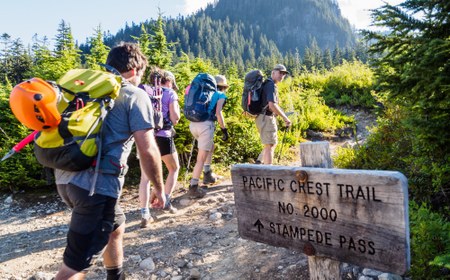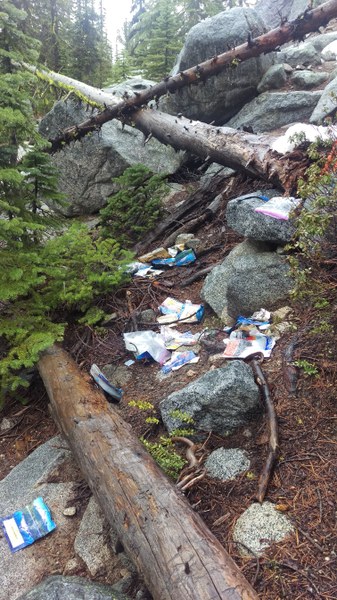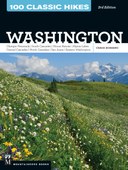
It’s no surprise to any of us who have been hiking and adventuring in our wild places since the days of heavy luggedsole boots, knee high cotton socks, and external frames that in the words of conservationist Rick McGuire of the North Cascades Conservation Council and Alpine Lakes Protection Society: we are currently facing a human tsunami on our trails. And if we’re to stay true to this metaphor, a tsunami inundating our wild places isn’t going to leave them in good shape.
Unless you’ve been doing all your hiking in the far reaches of Northern Canada or the wide empty expanses of the Great Basin you surely must be noticing some disturbing trends. On your next hike, look around. How many bags of dog excrement do you see lining the way? How much human waste do you see lying on the forest floor surrounded by fetid blossoms of toilet paper? How many discarded plastic bottles, crumpled tissues, snack wrappers, and plastic bags do you see in the brush? How many illegal fire rings have you encountered this summer — and how many of them were still smoldering?
How many trampled heather meadows, eroded switchbacks from trail-cutting, initials carved into trees, bridges, even historic Native American petroglyphs, have you recently encountered? How many times has your peace in the backcountry been interrupted by some self-centered boor blasting godawful noise from Bluetooth speakers? And how many times have you watched some narcissistic fool disregard rules and regulations to get the perfect selfie to share his new paradise found with hundreds of strangers who will soon be bringing their bad behavior with them as well? Yeah—if this newfound stoke among the masses is what’s needed to protect our wild places, count me as a heretic who says nay.
You see, I’m concerned about all the new, uneducated masses heading outdoors. It’s bad enough that our federal government is neglecting our wild places by seriously underfunding and threatening them with developments and fewer environmental protections. Add thousands upon thousands of clueless hikers and outdoor users — many feeling entitled to do what they please — and you’re looking at a recipe for disaster for our trails and wild places. And if you dare point out how they’re violating wilderness ethics, etiquette, and in many cases downright common sense and courtesy, in their words you’re just a hater. Call me a hater then because I hate seeing our public lands, wild places, and precious wilderness areas trashed and abused.

Wildlife got into a garbage bag near Colchuck Lake. Photo by Colin Foster.
When I first started hiking back in New Hampshire in the 1980s I quickly learned how so many of the wild places I had come to love were established and protected not by the government, but by concerned citizens. With a newfound passion to save more places, I joined the Society for the Protection of New Hampshire Forests (SPNHF). I was now stoked to save, protect, and fight for New Hampshire’s wild places. And this stoke never wavered. I just received my 35 year pin from SPNHF. As I became aware of more wild places through my travels, — my new found stoke led me to want to protect them. I joined the Save the Redwoods Foundation, Save the Manatee Club, the Green Mountain Club, and the Wilderness Society after taking numerous hikes in California, Florida Vermont, and all over the country.
The last few years have seen me heading deeper into the wilderness and farther away from the masses. It’s not that I don’t like company. I do. I just don’t like bad company. And on my treks I’ve been doing some serious soul searching. In theory, getting more people stoked on our trails and out into our wild lands is supposed to translate into more people willing to protect those lands. It’s a mantra that I have long subscribed to and one that I have sounded off in my hiking guidebooks. But I wonder, how much of this new stoke is nurturing the next wave of conservationists and good trail stewards? If the answer lies in the amount of trash and toilet paper lining our trails, we are literally and figuratively in deep doo doo.
I didn’t always feel this way about getting more people stoked to get outside. But I have always felt strongly about being a good steward of the land and a defender of wild places. And I have always welcomed fellow hikers and backcountry users that share that ethos. I don’t mind at all sharing the trail with a thousand enlightened hikers. I abhor being out there with just one jerk. And lately it seems like there are far more jerks on the trail than in the past. But is that true?
We have actually walked this path before. Back in the 1960s there was a huge back to the earth movement that had scads of young people heading into the wilderness and on the trail. And not surprisingly, many of these neophytes were partaking in some abhorrent behavior — like cutting down tree boughs for campsites, trenching a campsite, camping in meadows and along fragile lakeshores, burning or burying garbage, and bathing in lakes and creeks. Many of the shelters along the Appalachian Trail became counterculture squatter camps. As the trails and backcountry took a beating, it was only natural that a new awareness would soon spawn one that preached the concept of Leave No Trace, going light on the land and being good backcountry stewards. Groups like the Appalachian Mountain Club and The Mountaineers made it part of their mission to make sure that these hikers were recreating responsibility.
I started hiking in the 1980s and over the years really noticed remarkable changes on the trail. They were getting cleaner. The backcountry was being treated with more respect, and I was noticing less and less boorish behavior. Trail use continued to grow, but folks were finding these trails through guidebooks and outdoors clubs and other means that emphasized proper backcountry travel and behavior. But then a funny thing happened within the last decade — the advent of the smart phone with its ubiquitous byproduct of dumb behavior.
Many within this new wave of hikers and outdoors people are finding their way to the trails through Instagram, Facebook, and YouTube. Many heading up the trails and into the backcountry are armed with only a phone and no clue on how to properly recreate. In many cases they are endangering themselves, and in others they are literally trashing the environment. While I can understand that they may not know how to properly relieve themselves in the backcountry, the leaving of trash behind totally bamboozles me. Where is Woodsy the Owl when you need him? Where is common sense? Oh yeah, there’s no app for it. No, stoke alone won’t save us. Unfettered, it can actually harm our environment. What will save our wild places is stoke coupled with education and a vigilance to protect and enhance them.
When I moved to Washington in 1989 I joined The Mountaineers, then Conservation Northwest (originally the Greater Ecosystem Alliance), Washington Trails Association, Skagit Land Trust, San Juan Preservation Trust, Columbia Land Trust, and Friends of the Columbia Gorge. Bring them on! I feel morally and ethically bound to give back, to protect and fight for the wild lands that have given so much purpose to my life and which have constantly kept me stoked to hit the trail and learn something new about the natural world and myself. I have made it my mission through my career as a guidebook author and outdoors writer to help get new people into the outdoors — and for them to become good stewards and strong advocates for the protection of those lands.
So yes, despite how much garbage I have been finding on the trail lately, and how much clueless behavior I have been encountering in the backcountry lately, I still do believe that stoke will save these places. But not stoke alone. It must be coupled with education that emphasizes Leave No Trace and good stewardship. Those of us who care so deeply about our wild places have a mission — and a big one. We absolutely need to get stoked to help guide the new masses of hikers onto the right path. The numbers of new outdoor recreationists are grand. Just think of what can happen when they all become good environmental stewards. We have so much to lose if we don’t embrace them and help educate them. And we have so much to gain if they join our ranks.
Want more from Mountaineers magazine? Read a contrasting piece by Louis Geltman, Policy Director at Outdoor Alliance, entitled 'Stoke is Exactly what Outdoor Conservation Needs'.
This article originally appeared in our Fall 2018 issue of Mountaineer Magazine. To view the original article in magazine form and read more stories from our publication, click here.
Add a comment
Log in to add comments.https://www.hcn.org/.../recreation-your-stoke-wont-save-us
Thanks for great article Craig. I too have seen these changes on the trail. It has been truly painful to see favorite places turned into trash cans. Investments in teaching must be made or we risk losing the places we love.
 Craig Romano
Craig Romano
